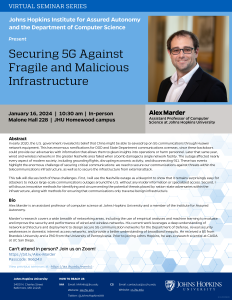
Title: Securing 5G Against Fragile and Malicious Infrastructure
Abstract: In early 2020, the U.S. government revealed its belief that China might be able to eavesdrop on 5G communications through Huawei network equipment. This has enormous ramifications for DOD and State Department communications overseas, since these backdoors could provide our adversaries with information that allows them to glean insights into operations or harm personnel. Later that same year, wired and wireless networks in the greater Nashville area failed when a bomb damaged a single network facility. The outage affected nearly every aspect of modern society, including grounding flights, disrupting economic activity, and disconnecting 911. These two events highlight the enormous challenge of securing critical communications: we need to secure our communications against threats within the telecommunications infrastructure, as well as to secure the infrastructure from external attack.
This talk will discuss both of these challenges. First, I will use the Nashville outage as a blueprint to show that it remains surprisingly easy for attackers to induce large-scale communications outages around the U.S. without any insider information or specialized access. Second, I will discuss innovative methods for identifying and circumventing the potential threats placed by nation-state adversaries within the infrastructure, along with methods for ensuring that communications only traverse benign infrastructure.
Bio: Alex Marder is an assistant professor of computer science at Johns Hopkins University and a member of the Institute for Assured Autonomy.
Marder’s research covers a wide breadth of networking areas, including the use of empirical analyses and machine learning to evaluate and improve the security and performance of wired and wireless networks. His current work leverages a deep understanding of network architecture and deployment to design secure 5G communication networks for the Department of Defense, reveal security weaknesses in domestic internet access networks, and provide a better understanding of broadband inequity.
He received a BS from Brandeis University and a PhD from the University of Pennsylvania. Prior to joining Johns Hopkins, he was a research scientist at CAIDA at UC San Diego.
Zoom: https://jhuapl.zoomgov.com/j/1615524979?pwd=ZDdnbDJQYnN3a1BwN3R0RFdXMTN2Zz09
Passcode: 966243